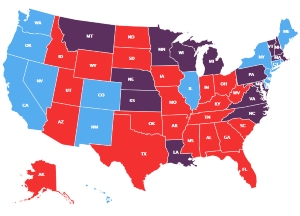Welcome to USAPP– American Politics and Policy
USAPP’s central mission is to increase the public understanding of social science in the context of American politics and policymaking. Our focus is broad-based and multidisciplinary, covering all aspects of governance, economics, politics, culture and society in the United States, and in its continental neighbors, Canada and Mexico.
We post at least one article every weekday and academic book reviews on Sundays.
USAPP is run by the London School of Economics’ (LSE) Phelan United States Centre, a hub for global expertise, analysis and commentary on America. Its mission is to promote policy-relevant and internationally-oriented scholarship to meet the growing demand for fresh analysis and critical debate on the United States.
We seek to contribute to a better informed public debate, to facilitate the sharing and exchange of knowledge between experts within and outside universities, and to open up the full richness of contemporary academic research so as to increase its perception and impact. We also seek to achieve a qualitative improvement in the British, European and rest of the world’s understanding of domestic politics in the United States at the level of states and major cities, and encompassing the full range of American social, urban and regional issues.
The development of the North American Free Trade Association (NAFTA), and the closely integrated economic and social development of Canada and Mexico in tandem with that of the United States, also increase the importance of looking at politics and policy across the whole of north America.
An enduring core of the blog draws on the community of academics and researchers at the London School of Economics. But we seek to build a much broader community of authors and contributors amongst social scientists from
- the full range of United States universities;
- British, European and overseas academics working on USA issues; and
- experts in Canadian and Mexican social science.
We especially seek to create new forms of dialogue and knowledge exchange that will improve the awareness of and capacity to analyse politics and policy issues across the United States and its two neighbours in the rest of the world.
The central role of all LSE blogs is knowledge exchange, bringing academic insights completely free and in understandable formats to citizens, journalists and policy-makers. We are committed to forms of social science communication that are shorter, better, faster and free. But we also seek to bridge between academia and the extensive research and evidence generated by NGOs, think tanks, professions, pressure groups and a wide range of organisations researching on American politics and policy themes. We encourage the submission of well-argued and evidence-based material that can improve public debate on any aspect of American politics and policy.
The USAPP Managing Editor is Chris Gilson from the LSE’s United States Centre.
We have no editorial ‘line’ except a commitment to communicating social science research and commentary in ways that enhance public debate and understanding.
For further information, and for details on how to submit a blog article, please email the Managing Editor at: c.h.gilson@lse.ac.uk
For further information, and for details on how to submit a blog article, please email the Managing Editor, Chris Gilson at: c.h.gilson@lse.ac.uk
Note for potential commenters on blogs
We welcome comments on all blogs and will accept any reasonable or constructive comment that contributes to debate, including strong criticisms – so feel free to say what you want within reason. We operate a propriety filter, so comments are routed to the Blog Team and not posted for public view until they have been checked. There will be a brief delay in posting overnight, at weekends and when we are very busy. Please note that we operate our comments system under the following guidelines:
- Email Privacy: Email addresses are required for commenting, and they are not published on the blog, nor shared. They may be used by the blog committee to privately contact the commenter.
- Language and Manners: This blog is for a wide audience, and comments which include offensive or inappropriate language, or considered by the blog committee and to be rude and offensive, will be edited or deleted.
- No Personal Attack Comments Permitted: No personal attacks are permitted in this blog’s comments. You may question or argue the content, but not attack the blogger, nor any other commenters.
- A Comment is Conversation: A comment which does not add to the conversation, runs off on an inappropriate tangent, or kills the conversation may be edited, or deleted.
- Limit Links: This blog is setup to automatically hold any blog comment with more than two links in moderation, which may delay your comment from appearing on this blog. Any blog comment with more than four links could be marked as comment spam.
- What To Do If Your Comment Does Not Appear: If you leave a comment on this blog and it does not appear in a reasonable time period, and you know that it does not violate these Comment Policies, contact the blog editor.
- Commenters Blocked: Anyone who violates this Comments Policy may be blocked from commenting on this blog.
- All Rights Reserved: The blog committee reserves the right to edit, delete, move, or mark as spam any and all comments. They also have the right to block access to any individual or group of people from commenting, or from the entire blog.
How to contribute to LSE USAPP
We encourage submissions of posts from academics, PhD students, and practitioners of 800 to 1,000 words that are evidence based and communicated in an accessible way. Our remit covers all aspects of American government and politics (including historical issues of contemporary relevance) and all aspects of American public policy (including theoretical issues and international/comparative aspects). We also cover domestic politics in the United States at the level of states and major cities, and encompass the full range of American social, urban and regional issues. We are keen to include one or two tables, charts, maps or relevant photographs where possible, but this is not essential.
Authors of material relating to overseas countries or international issues should ensure that their blog relates substantively to our remit of American politics and policy. Our Blog Team would be happy to advise and help, so you are welcome to propose ideas informally.
Please also read our editorial policy, and our style guide below, if you are interested in contributing.
If you are interested in writing for LSE USAPP, please send us an article pitch of one to two paragraphs outlining the article’s topic, its relevance to current events or trends (if applicable), and any research it is supported by, such as links to an academic journal article, book or unpublished research.
To submit potential articles, or an article pitch, or for further information, please email the Managing Editor at: c.h.gilson@lse.ac.uk
These guidelines will help you to have your article published on USApp as quickly as possible. Please see our editorial policy for further information about what to expect after submitting your article. If you have any questions about your contribution, please email us at c.h.gilson@lse.ac.uk
Length and format
- In order to increase readability and accessibility, we aim for our articles to be between 800 and 1,200 words.
- We are also happy to post longer essays of over 2,000 words, if appropriate for the topic. If you are interested, please discuss this with the blog team.
- Please send us your draft article in Word format, with your name at the top.
Audience, writing style and language
- Our main aim is to increase the public understanding of the social sciences in the US. With this in mind, your article should be written with a relatively wide audience in mind, including policy-makers and other non-academics.
- Our most widely read blog articles are written in a more natural style, so we recommend that you avoid overusing acronyms and academic terms, such as Latin words, or specific terminology that may not be well known outside disciplinary circles. Also avoid saying things like “In this paper I will…”, or “This paper aims to…”, and go straight into your discussion of the topic.
- Use short paragraphs made up of four or five sentences
- As with journalistic pieces ‘lead with the best.’ Don’t save your main argument or analysis for the end of the post.
- Write your article as a standalone piece, even if it summarises material in a longer paper or journal article. Try to present all of your argument and evidence within the text and avoid relying too heavily on information contained in external sources. Avoid phrases such as “in my recent paper, I have shown that political pollsters tend to get it wrong…” and simply say “Political pollsters get it wrong for these reasons…” Remember that many journal articles are behind a paywall and not all readers will have access to them.
- For good examples of blog writing style and presentation, please see the LSE’s family of blogs.
Referencing
- We use links rather than citations for references. Links should direct readers to more detailed reports or other pieces of research, news items or other blog posts. Open access sources are preferable compared to those behind paywalls.
- Please insert a hyperlink at the relevant point of your argument that you’d like to reference (using ctrl-K in Word) or simply place the URL in parentheses where you would like it to be placed and we will link it ourselves.
Titles
- We use narrative titles, i.e a single sentence that sums up the main argument of the article. The more descriptive and catchy the title, the more likely the article is to be read. Try to avoid questions (How can Senate deadlock be overcome?) or general topics (Inequality in the Rust Belt). Some examples of good titles:
If Europe is to tackle its demographic decline it should take lessons from the USA’s comprehensive immigration reforms.
The evidence suggests that the conflict in Chechnya was not a major factor in the motivation of the Boston bombers
- Try and keep titles to twenty words or less, if possible
Graphs and Charts
- We encourage the use of charts and figures. Graphs and charts are preferable to tables, as they are easier for readers to interpret quickly. In all cases, please send us the raw data of your chart, table, or figure in Excel format.
- Each chart needs a clearly labelled heading, labels for the X and Y axes or histogram bars, including units of measurement and a readable scale or background grid.
- There should be a clear legend distinguishing multiple data series from each other and a brief note on sources. Lines must be thick enough and distinctively coloured. Charts should use a numerical progression to make comparisons more visible
Biography and contributor photo
- We’re proud of our contributors, so we like to give them full attribution. Please send us a three to four line biographical note, with your academic position, research interests, and details of your two most recent books.
- Please also send us a small colour photo headshot. Our preference is for a more formal portrait style, rather than a photo taken from an event.
Our editing process
- In most cases submitted articles will be reviewed speedily by the Blog Team, who will edit the piece to enhance readability to the blog’s wider audience. Once these edits are complete, we will send you the final version of the article, and give you an opportunity to make final edits.
- All articles on LSE USApp should be evidence based. With this in mind, editors may double-check the factual accuracy of certain points, or ask you for links to supporting information.
All contributions that are submitted will be acknowledged by the Managing Editor as soon as possible. Occasionally, an article may not fit our remit of American politics and policy; in that case we will advise authors on how best to rewrite articles so that we are able to publish them.
In most cases submitted articles will be reviewed speedily by at least two members of the Blog Team, who will edit the piece to enhance readability to the blog’s wider audience. These edits may include:
- Shortening of text if the article is above our stated 1,000 word limit
- The addition of a narrative-style title to sum up the post’s main findings
- The addition of short introductory paragraph outlining the article’s author, their main arguments and findings, and any relevant background information for readers.
Once these edits and revisions are complete, we will send the final version of the blog article to authors with an estimated date and time of publication, and give the author an opportunity to make any further edits they deem are necessary. Please note that owing to events and other circumstances beyond our control, we may have to change our posting order at very short notice.
Unfortunately, due to time pressures, authors may have less than 24 hours to approve our edits. However, once articles are published, we are very happy to make further edits afterwards should the author deem them to be necessary.
Creative Commons and article sharing policy
Unless otherwise specified, all of our articles are also published under the Creative Commons licence, (CC BY-NC-3.0) and other blogs and publications are free to use them, with attribution.
USApp also also has agreements to share content with a number of other blogs and online journals:
Blogs in the LSE’s blog family, and:
If you do not wish for your article to be republished anywhere else, please let us know, otherwise, we will assume that you are happy for us to do this. Additionally, if you are concerned that your work has been posted on any site that is not listed above, please let us know by emailing the blog team at c.h.gilson@lse.ac.uk
Role of the General Editor
As part of our processes, the blog team will refer the following types of articles to the General Editor (which may cause your blog’s publication to be delayed):
- Articles that are potentially libellous or defamatory
- Articles where the blog team has concerns about author’s potential conflicts of interest
- Articles that are insufficiently evidence based or lacking in academic rigour
- Any other articles that may impact on the reputation of the author, the LSE, or the LSE Public Policy Group
In the hopefully rare cases where the General Editor cannot accept a blog, authors can appeal to our Advisory Board and we will ask two members to adjudicate the issue.
If you have any questions about our policy, please let us know by emailing the Blog Manager at c.h.gilson@lse.ac.uk
USAPP team
 Managing Editor: Chris Gilson – LSE Phelan US Centre
Managing Editor: Chris Gilson – LSE Phelan US Centre
Chris Gilson is the Managing Editor of USAPP, the LSE US Centre‘s daily blog on US politics and policy. He also co-hosts the US Centre’s podcast on American politics, The Ballpark. He was previously Managing Editor of the LSE’s British Politics and Policy blog, and of EUROPP – the LSE’s European Politics and Policy blog, both for the LSE’s Public Policy Group. He has a undergraduate and a Masters degree in Geography, and a postgraduate diploma in Strategic Management, all from the University of Waikato, Hamilton, New Zealand.
Email: c.h.gilson@lse.ac.uk
 General Editor: Professor Peter Trubowitz – Department of International Relations and Director of the LSE Phelan US Centre
General Editor: Professor Peter Trubowitz – Department of International Relations and Director of the LSE Phelan US Centre
Peter Trubowitz is Professor of International Relations at the LSE. He specializes in the field of U.S. grand strategy and foreign policy and is the author of Politics and Strategy: Partisan Ambition and American Statecraft (Princeton University Press) and Defining the National Interest: Conflict and Change in American Foreign Policy (University of Chicago Press), as well as numerous journal and magazine articles. Before joining the LSE, Trubowitz was Professor of Government at the University of Texas at Austin, where he taught in the fields of international security and foreign policy. He received his Ph.D. from MIT.
 Dr Stephanie Rickard– Government Department
Dr Stephanie Rickard– Government Department
Stephanie J. Rickard is an Associate Professor at the London School of Economics in the Department of Government. She earned her PhD at the University of California, San Diego and her BA at the University of Rochester. Her research examines the effects of political institutions on economic policies and appears in journals such as International Organization, The Journal of Politics,British Journal of Political Science, and Comparative Political Studies. Her current research includes a study of “buy national” procurement policies and an investigation into how national elections impact on IMF loan negotiations.
 Dr Cheryl Schonhart-Bailey – Government Department
Dr Cheryl Schonhart-Bailey – Government Department
Cheryl Schonhardt-Bailey is a native of Boise, Idaho in the USA. She has a PhD in Political Science from the University of California Los Angeles. She is a Reader in Political Science at the London School of Economics and has published several articles and books on 19th century British trade policy. She has employed textual analysis software to examine legislative debates on abortion, and the rhetoric of US presidents (from Woodrow Wilson to Barack Obama). Her most recent book is Deliberating American Monetary Policy: A Textual Analysis (MIT Press, 2013) which provides a systematic examination of deliberation on monetary policy from 1976 to 2008 by the Federal Reserve’s Open Market Committee (FOMC) and House and Senate banking committees.
 Professor Patrick Dunleavy – LSE Public Policy Group
Professor Patrick Dunleavy – LSE Public Policy Group
Patrick Dunleavy is Professor of Political Science and Public Policy at the London School of Economics and Political Science, where he has worked since 1979. He has authored and edited numerous books on political science theory, British politics and urban politics, as well as more than 50 articles in professional journals. He is Chair of the PPG. Email: p.dunleavy@lse.ac.uk
The USAPP blog is run by staff from the LSE’s Phelan United States Centre. The blog team gratefully acknowledge the financial support of the HEIF5 programme run by LSE Knowledge Exchange.
















